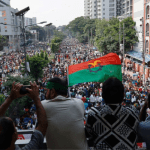An execution of a man who had been detained amid the country’s ongoing countrywide protests was reported by Iran on Thursday.
The protester, named Mohsen Shekari by Iranian news organisations, is believed to be the first protester to be put to death by the Iranian government.
He was convicted of blocking Sattar Khan Boulevard in the capital Tehran and injuring a security guard with a machete on September 25.
Mr Shekari was convicted on November 1 for “waging war against God” under Iran’s sharia law. The ruling was upheld by the supreme court on November 20 despite an appeal.
Five more persons were sentenced to death by hanging for the murder of a volunteer Basij security force member in Iran.
According to Amnesty International, at least 21 people are facing the death penalty as a result of “fake trials aimed to scare those engaged in the popular revolt that has rocked Iran.”
“The Iranian authorities must immediately vacate all death sentences, desist from pursuing the death penalty, and dismiss all charges against anyone arrested in connection with peaceful protests,” Amnesty stated.
The director of the Oslo-based NGO Iran Human Rights, Mahmood Amiry-Moghaddam, called for “rapid practical consequences internationally” to the execution to prevent the possibility of “facing daily execution of prisoners.”
German Foreign Minister Annalena Baerbock slammed the “Iranian regime’s contempt for human life” and the “perfidious” trial of Shekari, in a tweet. “The threat of execution will not suffocate the will for freedom,” she added.
The protests have proven to be one of the biggest challenges the Islamic Republic has faced since the 1979 revolution that ousted the Shah and brought Ayatollah Khomeini — and his successor Ayatollah Ali Khamenei — to power.
Protesters first took to the streets following the death of 22-year-old Jina Mahsa Amini while in detention. She had been arrested by Iran’s so-called “morality police” for failing to abide by the country’s strict dress code.
The protests began in Kurdistan’s western province, Amini’s home territory, but quickly expanded throughout the country.













